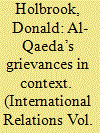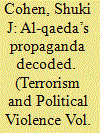| Srl | Item |
| 1 |
ID:
151000


|
|
|
|
|
| Summary/Abstract |
At a time when political debate in the West is preoccupied with the perceived impact of extremist ideas on individuals who embrace or support terrorism, this article uses the publicly articulated grievances of Ayman al-Zawahiri, Al-Qaeda’s most prolific ideologue, as a case study to examine how a globally focused and distributed extremist narrative matches political realities on the ground. The approach of the article is to compare two political processes: the approach of Islamist extremists, as represented by Zawahiri, to constitutional reform as articulated through public appeals to potential supporters versus the reality of constitutional amendments and evolution of fundamental law in the Middle East and South Asia. Incorporating insights from studies on law and society and International Relations, the article demonstrates how Zawahiri’s interpretation of religious law emphasises wholesale adoption of sharia while the process of legal reform has invariably resulted in the creation of legal hybrids, mixing Islamic and non-Islamic legal traditions. This is not an article about theology or religious law but an effort to dissect the public relations of an international terrorist movement. The analysis pays particular attention to events in Zawahiri’s native Egypt, where evolving grievances concerning a series of constitutional amendments – including those following the Arab revolutions and the toppling of Mohammed Morsi – are assessed.
|
|
|
|
|
|
|
|
|
|
|
|
|
|
|
|
| 2 |
ID:
159888


|
|
|
|
|
| Summary/Abstract |
We describe a novel hybrid method of content analysis that combines the speed of computerized text analysis with the contextual sensitivity of human raters, and apply it to speeches that were given by major leaders of Al-Qaeda (AQ)—both in its “core” Afghanistan/Pakistan region and its affiliate group in Iraq. The proposed “Ideology Extraction using Linguistic Extremization” (IELEX) categorization method has acceptable levels of inter-rater and test-retest reliabilities. The method uncovered subtle (and potentially non-conscious) differences in the emphases that Usama Bin Laden and Ayman Al-Zawahiri put on the various components of their ideological justification for terrorism. We show how these differences were independently recognized as the crux of the rift in AQ, based on documents that were confiscated in Abbottabad following Usama Bin Laden’s assassination. Additionally, several of the ideological discrepancies that we detected between AQ “core” and its Iraqi affiliate correspond to schisms that presumably led to the splintering of AQ Iraq and the rise of ISIS. We discuss IELEX’s capability to quantify a variety of grievance-based terrorist ideologies, along with its use towards more focused and efficient counter-terrorism and counter-messaging policies.
|
|
|
|
|
|
|
|
|
|
|
|
|
|
|
|